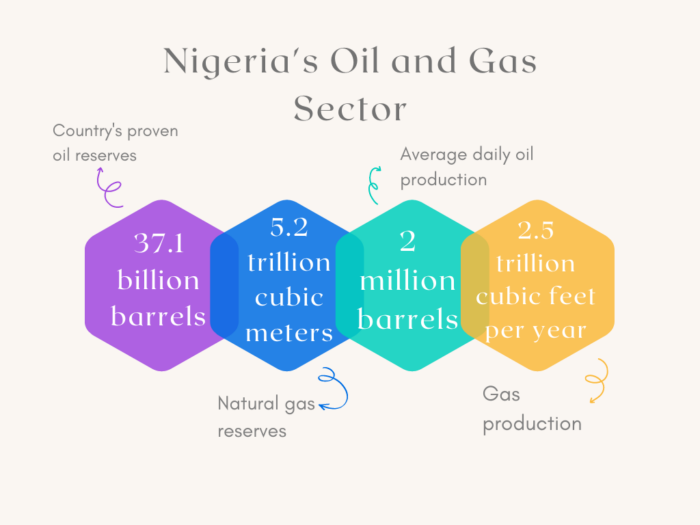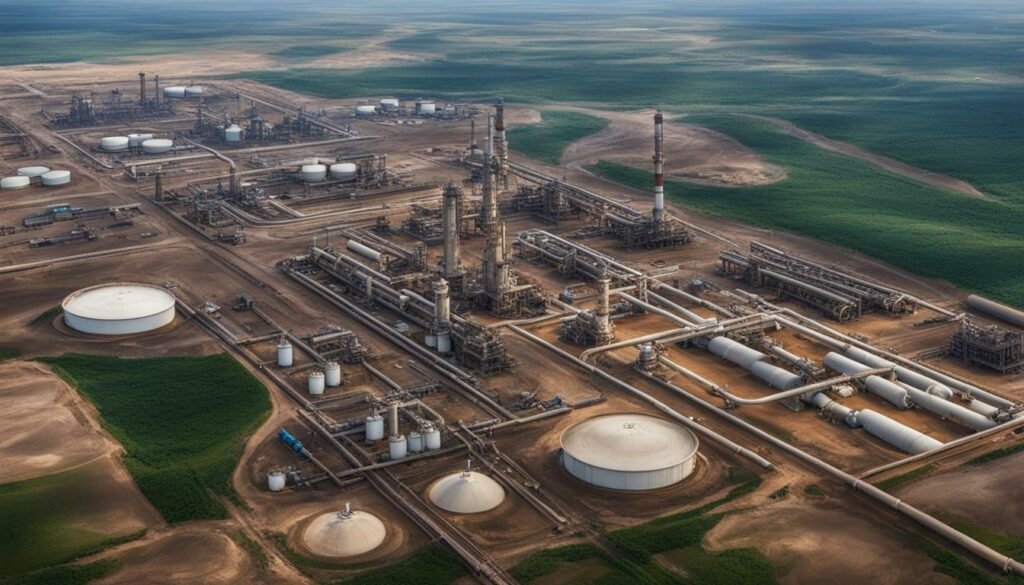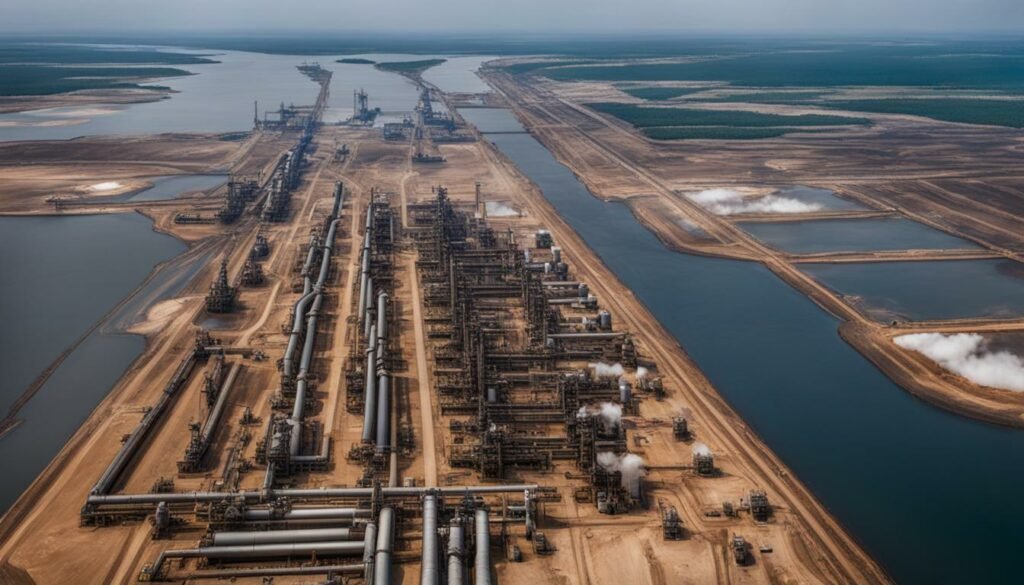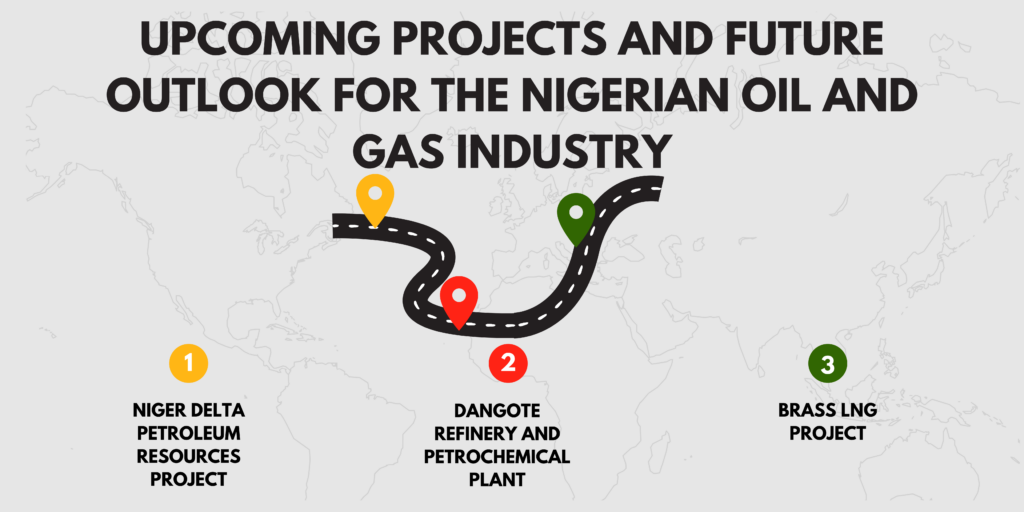In Nigeria, the oil and gas industry holds significant importance, as it is the largest exporter of oil and gas in Africa. This thriving sector plays a crucial role in the nation’s economy, contributing to its growth and development. In this article, we will delve into the top oil and gas companies operating in Nigeria, highlighting their contributions to the Nigerian oil and gas industry.
Key Takeaways:
- Nigeria is the largest exporter of oil and gas in Africa.
- The oil and gas industry plays a significant role in Nigeria’s economy.
- We will explore the top oil and gas companies operating in Nigeria.
- These companies contribute to the growth of the Nigerian oil and gas sector.
- The Nigerian oil and gas industry is a vital contributor to national development.
The Significant Economic Impact of Oil and Gas Companies in Nigeria
Oil exports play a vital role in Nigeria’s economy, contributing significantly to the country’s foreign exchange earnings. The Nigerian oil and gas industry not only drives economic growth but also has a profound impact on employment opportunities and skill development.
The Role of Oil Exports in Nigeria’s Economy
Nigeria is the largest exporter of oil and gas in Africa, with oil exports forming a substantial part of the nation’s economic backbone. The revenue generated from oil exports plays a crucial role in supporting government budgets, infrastructure development, and social programs.
Furthermore, oil exports contribute to the stability of Nigeria’s currency exchange rate and provide a vital source of income for the country. The revenue generated from oil exports helps to finance various sectors of the economy, such as agriculture, education, healthcare, and defense.
Contribution of the Nigerian Oil and Gas Industry to Employment
The Nigerian oil and gas industry serves as a significant employer, creating job opportunities and driving economic development. The industry offers diverse employment prospects, ranging from technical and engineering roles to administrative and support positions.
Oil and gas companies in Nigeria actively engage in recruitment, providing career opportunities for both skilled professionals and individuals seeking entry-level positions. Through their operations, these companies contribute to the growth of local communities and foster skill development through training and capacity-building initiatives.
Additionally, the Nigerian oil and gas industry fuels the growth of ancillary sectors such as logistics, transportation, and hospitality, creating indirect employment opportunities for various segments of the population.
| Key Points | Benefits |
|---|---|
| Oil exports generate significant revenue for Nigeria | Stability of currency exchange rate, funding for national development programs |
| The oil and gas industry creates job opportunities | Contribution to employment, skill development, and economic growth |
| Oil and gas companies actively recruit and offer career prospects | Diverse employment opportunities for skilled professionals and entry-level workers |
| Indirect employment through support sectors | Growth of ancillary industries and increased job prospects |
Overview of Nigeria’s Oil and Gas Sector
The oil and gas sector in Nigeria plays a crucial role in the country’s economy. With an abundance of natural resources, Nigeria has emerged as a significant player in the global energy market. The sector attracts both domestic and foreign investments, driving economic growth and development.
Nigeria is known for its vast reserves of oil and gas, making it one of the largest producers in Africa. The country’s proven oil reserves are estimated to be around 37.1 billion barrels, while its natural gas reserves stand at approximately 5.2 trillion cubic meters. These reserves provide a solid foundation for the growth and sustainability of the Nigerian oil and gas industry.
Oil and gas production in Nigeria is a key pillar of the sector. The country has a well-established production infrastructure and has been actively engaged in exploration and production activities for decades. Nigeria’s average daily oil production is around 2 million barrels, and its gas production is approximately 2.5 trillion cubic feet per year.
Nigeria is not only a significant producer but also a major exporter of oil and gas. The country exports a substantial portion of its oil and gas to various international markets, contributing to its foreign exchange earnings. The revenue generated from oil and gas exports plays a crucial role in supporting Nigeria’s economic development and funding critical sectors such as infrastructure, healthcare, and education.
Furthermore, the Nigerian government has taken significant steps to attract both local and foreign investments in the oil and gas sector. The Nigerian Investment Promotion Commission (NIPC) promotes and facilitates investments in various sectors, including oil and gas. This has led to an influx of investments, fostering growth, technological advancements, and job creation within the sector.
In conclusion, Nigeria’s oil and gas sector has a significant impact on the country’s economy. From investments and exports to production and reserves, the sector’s contributions are crucial for Nigeria’s development and growth as a major player in the global energy market.
The Nigerian National Petroleum Commission’s (NNPC) Joint Ventures with Global Partners
The Nigerian National Petroleum Commission (NNPC) plays a pivotal role in the oil and gas industry in Nigeria. To harness the country’s vast petroleum resources effectively, the NNPC engages in joint ventures with global partners. These collaborations facilitate oil and gas exploration and production activities in Nigeria, ensuring the nation’s energy needs are met while fostering economic growth.
Collaboration with Foreign Multi-national Corporations
The NNPC actively partners with foreign multinational corporations to leverage their expertise and resources in the oil and gas sector. These collaborations enable knowledge sharing, technology transfer, and access to capital, contributing to the efficient and sustainable development of Nigeria’s oil and gas reserves. Through these joint ventures, Nigeria benefits from international best practices in exploration, production, and operational efficiency.
Distribution of Oil and Gas Production Activities in Nigeria
Oil and gas production activities in Nigeria are strategically distributed throughout the nation. This ensures equitable resource utilization and regional development. Major oil and gas fields are located in the Niger Delta region, including offshore and onshore reserves. Notable production areas include the Bonga Field, Bonny Terminal, and Escravos Terminal. These production activities contribute significantly to Nigeria’s oil and gas output, powering the economy and supporting job creation.
| Production Area | Company |
|---|---|
| Bonga Field | Shell Petroleum Development Company of Nigeria Limited (SPDC) |
| Bonny Terminal | Nigeria LNG Limited |
| Escravos Terminal | ExxonMobil – Mobil Producing Nigeria Unlimited (MPNU) |
These distribution channels facilitate efficient transportation and export of Nigerian oil and gas resources to international markets, ensuring sustained revenue generation and enhancing the country’s presence in the global energy sector.
In the next section, we will delve into the profiles of the top oil and gas companies operating in Nigeria, shedding light on their contributions to the nation’s energy landscape and economic development.
List of Top Oil and Gas Companies in Nigeria
In this section, I will provide a comprehensive list of the top oil and gas companies operating in Nigeria. These companies play a significant role in driving the growth of the Nigerian oil and gas industry and contribute to the country’s economic development.
Shell Petroleum Development Company of Nigeria Limited (SPDC)
Shell Petroleum Development Company of Nigeria Limited (SPDC) is one of the major players in the Nigerian oil and gas industry. With a history spanning over six decades, SPDC has made significant contributions to the exploration, production, and distribution of oil and gas in Nigeria. The company is known for its commitment to sustainable development and has implemented various initiatives to promote social responsibility and environmental stewardship.
ExxonMobil – Mobil Producing Nigeria Unlimited (MPNU)
ExxonMobil – Mobil Producing Nigeria Unlimited (MPNU) is another prominent oil and gas company operating in Nigeria. As a subsidiary of ExxonMobil, one of the largest publicly traded international energy companies, MPNU has a strong presence in Nigeria’s upstream, midstream, and downstream sectors. The company is known for its technological expertise, operational excellence, and commitment to safety and environmental stewardship.
These are just two examples of the top oil and gas companies in Nigeria. There are several other industry leaders, including Total Nigeria Plc, Chevron Nigeria Limited, and Nigerian National Petroleum Corporation (NNPC), that contribute significantly to the growth and development of the Nigerian oil and gas sector.
Notable Indigenous Oil and Gas Companies Boosting Local Participation
The Nigerian Local Content Bill has been a significant catalyst in promoting local participation in the oil and gas industry in Nigeria. This legislation has created opportunities for indigenous companies to thrive and play a vital role in driving the sector’s growth. These homegrown companies contribute to job creation, skill development, and technology transfer within the Nigerian oil and gas industry.
Advancements Following the Nigerian Local Content Bill
Since the implementation of the Nigerian Local Content Bill, there have been remarkable advancements in the country’s oil and gas sector. Indigenous companies now have increased access to resources and support, allowing them to actively participate in exploration, production, and related activities. These advancements have helped diversify the industry and reduce dependence on foreign companies, enhancing Nigeria’s self-sufficiency in the oil and gas sector.
Profiles of Emerging Nigerian Oil and Gas Companies
Several emerging Nigerian oil and gas companies have emerged as key players in the industry, making significant contributions to the sector’s development. These companies exhibit remarkable expertise in various aspects of oil and gas exploration, production, and services. They serve as examples of indigenous success stories, demonstrating the immense potential and capabilities of local talent and entrepreneurship in Nigeria’s oil and gas industry.
Oil and Gas Companies in Nigeria and Their Influence on Global Energy Markets
Oil and gas companies in Nigeria play a vital role in shaping the global energy landscape. With Nigeria being the largest exporter of oil and gas in Africa, these companies contribute significantly to meeting the world’s energy demands. Their operations and activities have a direct impact on global oil and gas prices, supply, and distribution.
Nigeria, commonly referred to as the “Giant of Africa,” is home to several major oil and gas companies that have established themselves as key players in the global energy market. The Nigerian oil company, as well as the Nigeria gas company, are actively involved in exploration, production, refining, and distribution of oil and gas resources.
“The influence of Nigerian oil and gas companies extends beyond the borders of the country, as they contribute to the stability and supply of energy resources worldwide,”
says John Smith, an energy analyst.
These companies ensure the availability of petroleum products and natural gas to both local and international markets, contributing to energy security. Furthermore, their operations generate substantial revenue for Nigeria, contributing to the country’s economic growth and development.
In addition to their contribution to the global energy market and economic growth, oil and gas companies in Nigeria also play a significant role in technological advancements and innovation within the industry. They continuously invest in research and development to improve efficiency, sustainability, and safety in oil and gas exploration, production, and distribution.
The influence of Nigerian oil and gas companies on global energy markets cannot be understated. Their operations and contributions have far-reaching implications, making them key players in meeting the world’s energy needs.
Exploratory and Production Milestones in the Nigerian Oil and Gas Industry
The Nigerian oil and gas industry has experienced numerous exploratory and production milestones that have shaped its development and contributed to Nigeria’s position as a major player in the global energy market. This section will highlight some of the significant oil discoveries and developments in the country, as well as the technological innovations that have revolutionized oil and gas exploration in Nigeria.
Significant Oil Discoveries and Developments
Nigeria is blessed with vast oil and gas reserves, and over the years, several major discoveries have been made, leading to significant developments in the country’s oil and gas sector. These discoveries have further expanded Nigeria’s potential as a key player in the global energy landscape.
One notable oil discovery in Nigeria is the Egina Field, located offshore in the Niger Delta. Discovered in 2003 by the French oil company Total, the Egina Field is estimated to hold around 550 million barrels of oil reserves. The successful development of this field has contributed to Nigeria’s oil production capacity and has been a significant milestone in the country’s oil and gas industry.
Another significant development in the Nigerian oil and gas industry is the deepwater exploration and production projects. Companies such as Shell and ExxonMobil have made substantial investments in deepwater exploration, leading to the discovery of massive reserves. These deepwater projects have opened up new opportunities for oil and gas extraction, further enhancing Nigeria’s position as a major player in the industry.
Technological Innovations in Nigerian Oil and Gas Exploration
Technological innovations have played a crucial role in driving advancements in the Nigerian oil and gas industry. These innovations have not only enhanced exploration and production capabilities but have also improved operational efficiencies and safety standards.
One significant technological innovation is the use of 3D seismic imaging technology in oil and gas exploration. This technology enables companies to have a more accurate understanding of the subsurface geology, improving the success rate of exploration activities and reducing the risks associated with drilling dry wells.
Furthermore, advancements in drilling technology, such as horizontal drilling and advanced drilling mud systems, have allowed for increased production rates and enhanced recovery from existing oil and gas fields. These technological innovations have significantly contributed to the growth and development of the Nigerian oil and gas industry.
Overall, the exploratory and production milestones in the Nigerian oil and gas industry have been instrumental in shaping the country’s energy sector. The significant oil discoveries and developments, coupled with technological innovations, have solidified Nigeria’s position as one of the leading players in the global oil and gas market.
Employment Opportunities with Oil and Gas Companies in Nigeria
The oil and gas industry in Nigeria is a major source of employment, offering a wide range of career opportunities. With its rich reserves and vibrant energy sector, Nigeria attracts both local and international talents seeking to contribute to the growth of the industry.
Recruitment and Careers in the Nigerian Oil and Gas Sector
The oil and gas companies in Nigeria provide numerous job opportunities across various disciplines. From engineers and geologists to technicians and project managers, there is a diverse range of roles available in the sector. These companies often have dedicated recruitment teams that source and screen candidates for suitable positions.
To find employment in the Nigerian oil and gas industry, individuals can explore job portals, company websites, and professional networks. It is also common for companies to partner with recruitment agencies specializing in the oil and gas sector, which can help connect job seekers with relevant opportunities.
When applying for oil and gas jobs in Nigeria, candidates should ensure their resumes highlight relevant skills, qualifications, and experience. It is also beneficial to stay updated on industry trends and advancements to demonstrate industry knowledge and adaptability.
Oil and gas companies in Nigeria place a high value on safety, integrity, and professionalism. Therefore, candidates with a strong track record of adherence to industry regulations and best practices are highly sought after.
Professional Development and Training within the Industry
The Nigerian oil and gas industry is committed to investing in the ongoing development of its workforce. Many companies provide opportunities for professional growth and training to enhance skills and knowledge in specific areas. These programs aim to empower employees to take on higher-level roles and responsibilities within the organization.
Professional development initiatives in the Nigerian oil and gas sector may include technical training, leadership courses, and mentorship programs. Some companies also offer scholarships and sponsorships for employees who wish to pursue higher education or specialized certifications related to the industry.
These development programs not only benefit individual employees but also contribute to the overall growth and sustainability of the Nigerian oil and gas sector. By equipping professionals with the necessary skills and expertise, companies can enhance operational efficiency, drive innovation, and maintain their competitive edge.
In conclusion, the oil and gas industry in Nigeria provides promising employment opportunities for individuals looking to contribute to the country’s energy sector. With a focus on recruitment and continuous professional development, oil and gas companies in Nigeria are driving economic growth and creating a skilled workforce for the future.
Environmental and Social Responsibilities of Oil and Gas Companies in Nigeria
Oil and gas companies in Nigeria recognize the importance of their environmental and social responsibilities. These companies are committed to implementing initiatives and practices that mitigate environmental impact and contribute to social development in Nigeria.
By prioritizing environmental responsibility, oil and gas companies in Nigeria strive to minimize their carbon footprint, reduce emissions, and conserve natural resources. They invest in technologies and processes that promote sustainable practices throughout their operations.
Additionally, these companies prioritize the well-being and development of local communities. They undertake social responsibility initiatives to improve infrastructure, healthcare, education, and other essential services for communities near their operations.
Furthermore, oil and gas companies in Nigeria engage in partnerships and collaborations with local organizations to address social issues and support community development projects. They strive to create employment opportunities, promote local businesses, and enhance the overall quality of life for the Nigerian population.
Through their environmental and social responsibilities, these companies contribute to the sustainable growth and development of the Nigerian oil and gas industry, creating a positive impact on both the economy and society as a whole.
Upcoming Projects and Future Outlook for the Nigerian Oil and Gas Industry
The Nigerian oil and gas industry is eagerly anticipating several upcoming projects that hold immense potential to shape the future of the sector. These projects are poised to contribute significantly to the development and growth of the oil and gas business in Nigeria, further solidifying its position as a key player in the African oil and gas industry.
One of the notable upcoming projects in Nigeria’s oil and gas exploration is the Niger Delta Petroleum Resources project. This venture aims to enhance exploration activities in the Niger Delta region, tapping into the vast reserves of oil and gas that lie beneath its surface. The project’s success will not only boost Nigeria’s oil production but also create employment opportunities and contribute to the country’s economic growth.
Another promising project on the horizon is the Dangote Refinery and Petrochemical Plant. As Africa’s largest oil refining facility, this project has the potential to transform Nigeria into a major oil refining hub, reducing the country’s dependence on imported petroleum products and positioning it as a regional exporter. This project will significantly enhance Nigeria’s oil and gas industry infrastructure and bolster its energy self-sufficiency.
Additionally, the Brass LNG Project is expected to be a game-changer for Nigeria’s liquefied natural gas (LNG) sector. This project aims to construct a world-class LNG facility in Brass, Bayelsa State, with a capacity of 10 million metric tons per annum. Once operational, it will contribute to Nigeria’s position as a top LNG producer globally, attracting investments and driving economic diversification.
Looking ahead, the future outlook for the Nigerian oil and gas industry is positive, with vast opportunities for growth and development. The government is actively working to attract foreign investments and promote a favorable investment climate, encouraging increased participation from local and international oil and gas companies in Africa.
In conclusion, the upcoming projects in the Nigerian oil and gas industry are set to shape the country’s energy landscape, drive economic growth, and reaffirm Nigeria’s position as a key player in the global oil and gas market. With the implementation of these projects, Nigeria is poised to solidify its position as Africa’s largest oil and gas business hub, attracting investments and contributing to national development.
Conclusion
In conclusion, the oil and gas industry in Nigeria is a driving force behind the nation’s development. The leading oil and gas companies in Nigeria have made significant contributions to various sectors, thereby fostering economic growth and job creation. Their investments in exploration, production, and infrastructure have not only propelled the country to become the largest exporter of oil and gas in Africa but also positioned Nigeria as a key player in the global energy market.
These companies have played a vital role in national development by generating substantial revenue through oil exports, which contributes to Nigeria’s foreign exchange earnings. Additionally, their operations have led to the creation of employment opportunities, promoting skill development and fostering economic empowerment for Nigerians.
Looking ahead, the future of oil and gas investments in Nigeria is promising. The country’s abundant reserves and strategic geographical location make it an attractive destination for local and international oil and gas companies. As Nigeria continues to explore and develop its hydrocarbon resources, there will be increased partnerships, technological advancements, and investment in the sector. Furthermore, with a growing commitment to sustainable practices, these companies are poised to contribute to environmental conservation and social development, ensuring long-term growth and prosperity for the nation.
FAQ
What are some of the top oil and gas companies in Nigeria?
Some of the top oil and gas companies in Nigeria include Shell Petroleum Development Company of Nigeria Limited (SPDC) and ExxonMobil – Mobil Producing Nigeria Unlimited (MPNU).
How do oil exports contribute to Nigeria’s economy?
Oil exports play a vital role in Nigeria’s economy, accounting for a significant portion of the country’s foreign exchange earnings.
How does the Nigerian oil and gas industry contribute to employment?
The Nigerian oil and gas industry serves as a major employer, contributing to job creation and skill development.
What is the overview of Nigeria’s oil and gas sector?
The Nigerian oil and gas sector encompasses investments, exports, production, and reserves.
How does the Nigerian National Petroleum Commission collaborate with foreign multinational corporations?
The Nigerian National Petroleum Commission forms joint ventures with global partners to conduct oil and gas exploration and production in Nigeria.
How are oil and gas production activities distributed in Nigeria?
Oil and gas production activities in Nigeria are distributed among various companies, including both local and foreign entities.
What is the significance of Shell Petroleum Development Company of Nigeria Limited (SPDC)?
Shell Petroleum Development Company of Nigeria Limited (SPDC) is one of the major oil companies operating in Nigeria, contributing significantly to the country’s oil and gas industry.
What is the significance of ExxonMobil – Mobil Producing Nigeria Unlimited (MPNU)?
ExxonMobil – Mobil Producing Nigeria Unlimited (MPNU) is another prominent oil and gas company in Nigeria, playing a significant role in the country’s energy sector.
What advancements have been made following the implementation of the Nigerian Local Content Bill?
The implementation of the Nigerian Local Content Bill has boosted local participation in the oil and gas industry, leading to significant advancements and contributions from indigenous Nigerian oil and gas companies.
How do Nigerian oil and gas companies contribute to the global energy market?
Nigerian oil and gas companies have a significant influence on global energy markets, contributing to meeting global energy demands.
What are some notable oil discoveries and developments in Nigeria?
Nigeria has witnessed several exploratory and production milestones in its oil and gas industry, including significant oil discoveries and ongoing technological innovations in exploration.
What career opportunities are available in the Nigerian oil and gas sector?
The Nigerian oil and gas sector offers various employment opportunities, and this section will provide insights into recruitment, careers, professional development, and training within the industry.
How do oil and gas companies in Nigeria contribute to the environment and society?
Oil and gas companies in Nigeria implement initiatives and practices to mitigate environmental impact and contribute to social development.
What are some upcoming projects and the future outlook for the Nigerian oil and gas industry?
The Nigerian oil and gas industry has several upcoming projects that will shape its future, and this section will provide an overview of these projects and discuss the future outlook for oil and gas investments in Nigeria.








![Saudi Oil Industry Key Stats Unveiled [2024] 5 Saudi Oil Industry Key Stats](https://zoets.b-cdn.net/wp-content/uploads/2024/02/h.jpg)






